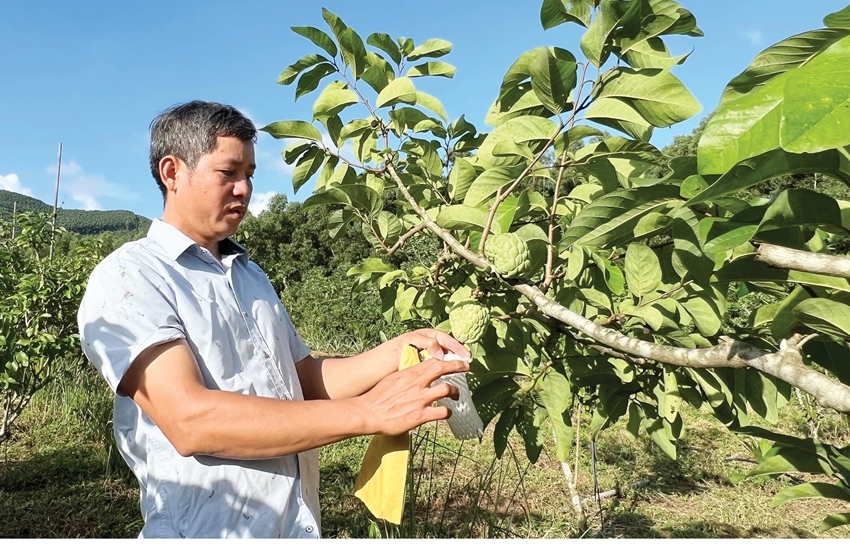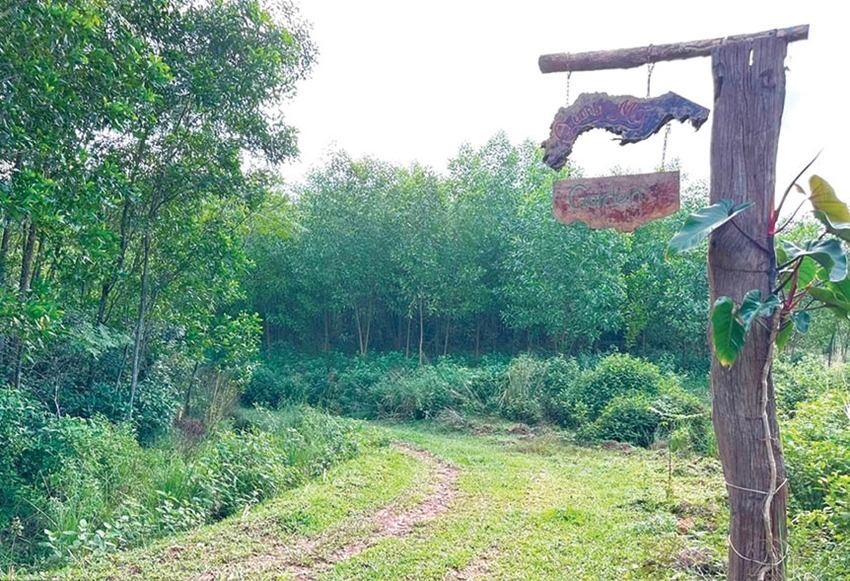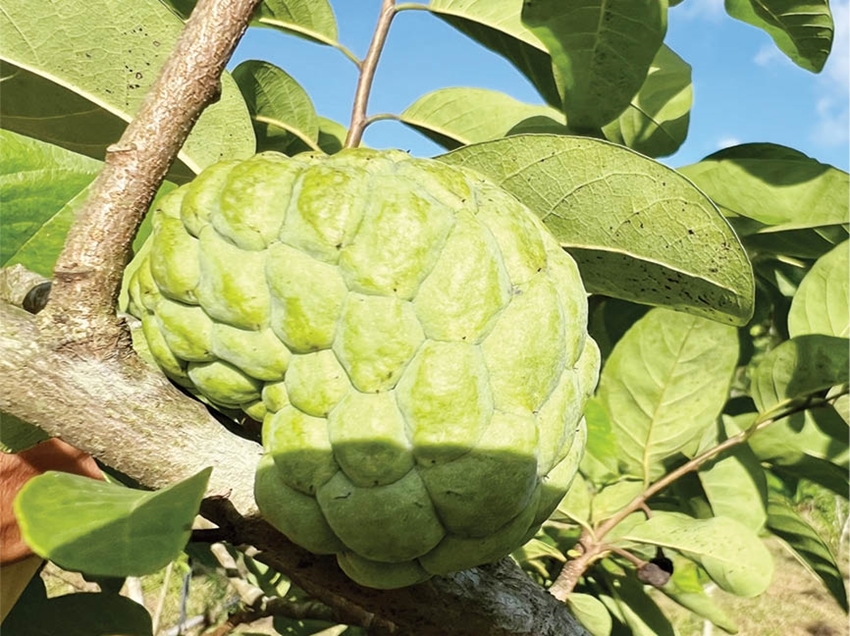 |
| Taking care of each custard apple |
Mr. My's farm is located on a small road near Huyen Khong Son Thuong Pagoda. While still unsure if we had arrived at the right place, we suddenly saw a rather unique and charming wooden sign "Quang My Garden" at the beginning of the winding and lush green road leading to the farm.
High income
The farm owner, with a very kind face, showed us around the 2-year-old custard apple orchard. A whole garden with 250 custard apple trees, with ripe fruits hanging on the trees, looked very pleasing to the eye. Mr. My said: "With the meaning of wishing for good things, peace, health, and prosperity, custard apples are the first choice for many people to display on the New Year's fruit tray, so I focus most on this type of fruit on the farm."
"Custard apple varieties from Taiwan and Thailand are beautiful and have a sweet and refreshing taste, while Vietnamese custard apples are sweeter but not as refreshing. If it hadn't been for the two heavy rains recently, each tree would have borne up to 40 fruits, but now each tree only has 5-7 fruits. Thai custard apples are about 3 fruits/kg, Taiwanese custard apples are very large, only 2 fruits/kg, and Vietnamese custard apples are smaller, around 5-6 fruits. On average, each custard apple tree yields 20 kg after 3 - 4 years of cultivation, selling at 100,000 VND/kg, which means each tree brings in about 2 million VND," Mr. My calculated.
It sounds attractive, but to grow off-season custard apples, according to Mr. My, growers must invest a lot and have very high technical skills, or in other words, their own secret. For example, using the flowers of Vietnamese custard apples for pollination of Taiwanese custard apples to shorten the harvesting time from 6 months to 5 months. The weather in Hue is unpredictable, so growing fruit trees for commercial purposes requires growers to have practical experience on the hilly land, otherwise, it is very easy to fail.

|
| Entrance gate of Quang My Garden |
Robinson... on the hill
As a native of Hue who ventured to Saigon to start his career, Mr. Nguyen Quang My spent 10 years working in the plant protection industry, guiding farmers in the Western, Eastern, Central Highlands regions, and even in the North on techniques for inducing off-season flowering in fruit trees - a type of fruit that always commands a very high price and brings significant income to farmers. However, in 2019, Mr. My made the decision to start a business in Hue.
He bought 1.8 hectares of hilly land to plant acacia trees in Huong Ho (Huong Tra town). Huong Ho hills were originally infertile and unsuitable for fruit tree cultivation, but this did not deter the daring farm owner. He reassured his wife: "The first 5 years will be tough, but by the sixth year, things will stabilize, and we'll have a high income." With 10 years of experience advising on the technical aspects of fruit tree cultivation, Mr. My was not afraid when he decided to establish a farm on the hills and firmly believed in his success.
The land improvement plan was immediately implemented by Mr. My by applying cow manure and planting pinto peanut plants to increase nitrogen levels and fix nitrogen in the soil. He also planted Vetiver grass symbiotically with fruit trees on the farm. "Vetiver is a type of grass that not only provides shade and retains moisture but also enhances soil structure and fertility. Every year, I harvest 20-30 tons of pinto peanut plants and Vetiver grass, which is a good organic material for the soil and reduces agricultural costs compared to using manure," pointing to the dry Vetiver grasses spread under the custard apple trees, Mr. My explained amidst our astonishment at the remarkable effect of this grass.
Not only custard apples, but Mr. My's hillside farm has also successfully cultivated green-skinned pomelos, Thai jackfruits, red-fleshed jackfruits, purple longans, and several other types of fruits. He mainly grows imported fruit trees from Taiwan, Thailand, Australia, South Africa, etc., but Mr. My still preserves and cultivates some native species such as Hoang Dieu oranges, thanh tra pomelo, Hue lime fruit to both generate income and preserve the native plant species of Hue. He is also experimenting with off-season pomelo cultivation.
"I hope the off-season pomelo grown on the hillside will have its own unique flavor. Currently, the off-season pomelo I planted is in its fourth year and is growing very well. It is expected to bear fruit on the full moon of April (Lunar Calendar). This is my new direction. In the future, when successful, I will expand the off-season pomelo cultivation model to the hills in Hue," Mr. My enthusiastically expressed.

|
| Taiwanese custard apples, when ripe, can weigh up to 0.5 kilograms |
Transforming arid hills into a prosperous farm
Mr. My's desire is to provide clean and safe fruit products to consumers. There have been tour groups visiting, experiencing, and highly appreciating the quality of the farm's fruits. With the success achieved after 4 years of fruit tree farming, Mr. My stated that the income from fruit trees on the farm would increase from 400-450 million VND per year starting from the sixth year. From the eighth year onwards, it will be 500-600 million VND per year. This is a significant income level for any agricultural farm owner intending to establish a farm on hilly terrain.
Hue's hilly land - once thought only suitable for acacia trees - has now become a fruit tree farm, generating high income from the determination of the farm owner, Quang My. The success of this model is hoped to be replicated, and more arid hilly areas in Hue will gradually become prosperous lands, bringing high incomes to farmers not only during the spring season.
